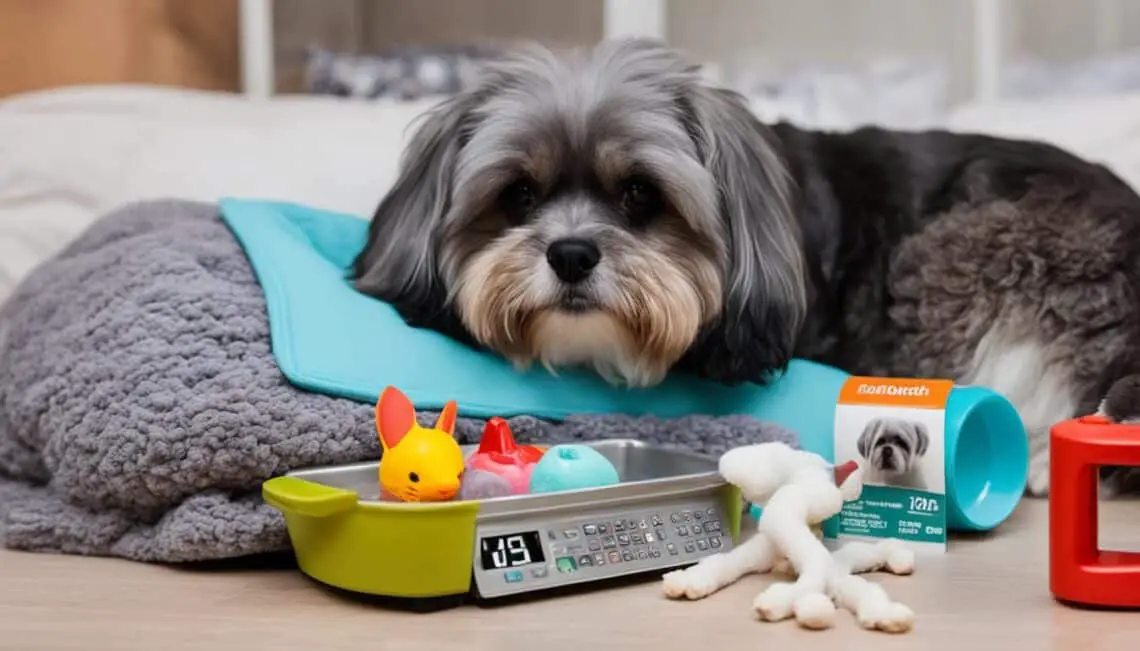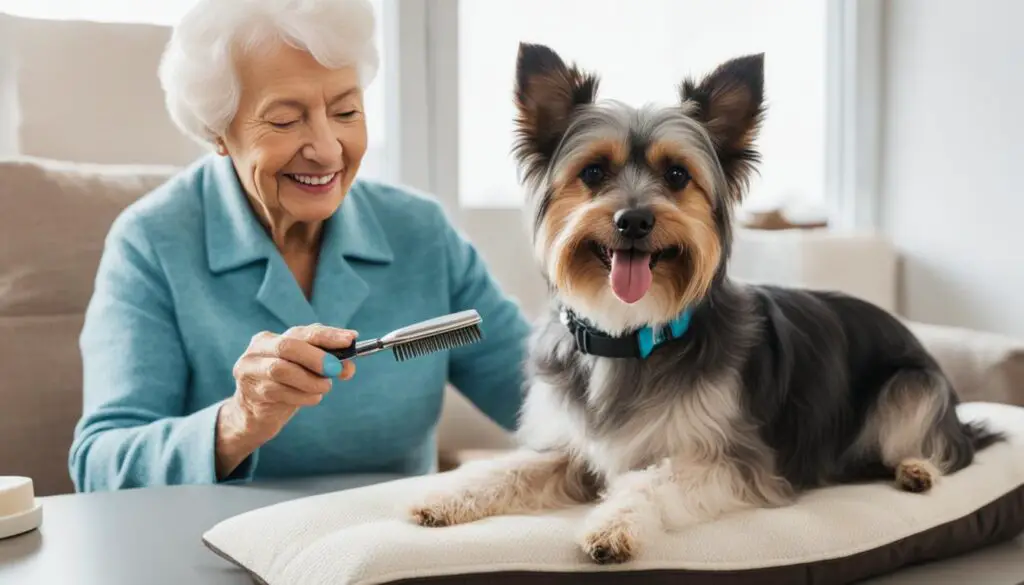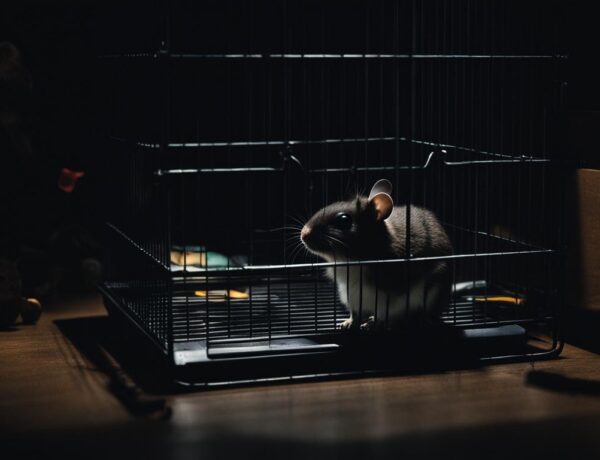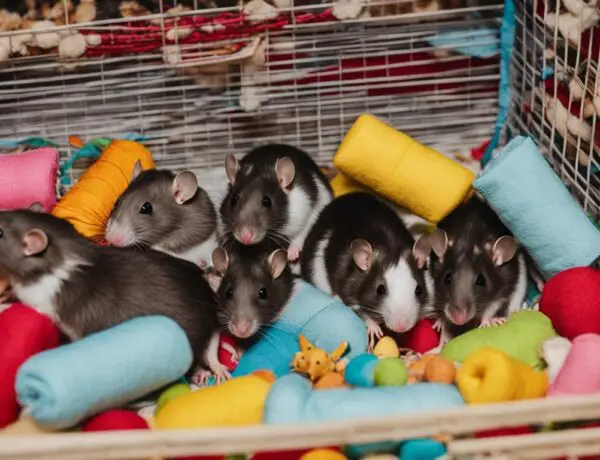As a pet owner, I understand the importance of providing proper care for our furry friends, especially as they enter their golden years. Just like humans, small pets such as cats and dogs age, and they rely on us to ensure their health and happiness during this stage of their lives. In this article, I will share essential care tips for elderly small pets, from veterinarian care to nutrition management, grooming to preparing for their golden years.
Key Takeaways:
- Regular veterinarian care is crucial for senior pets to detect and address potential health issues early on.
- Preventive exams and check-ups play a significant role in maintaining senior pets’ well-being and identifying signs of cancer or other health concerns.
- Grooming and hygiene are essential for senior pets, and regular brushing helps identify any abnormalities in their skin or coat.
- Weight and nutrition management are important to keep senior pets at a healthy weight and prevent obesity-related health problems.
- As senior pets become more sensitive to temperature changes, providing proper temperature regulation and investing in comfortable resting areas like orthopedic beds are crucial.
The Importance of Veterinarian Care
As our small pets enter their senior years, they become more susceptible to a range of health problems such as cancer, liver disease, thyroid disease, dental disease, heart disease, and diabetes. These health issues can significantly impact their quality of life and require immediate attention. That’s why regular veterinarian care is paramount for senior pets, helping to detect and address potential health concerns before they escalate. Preventive exams and check-ups play a crucial role in identifying early warning signs and facilitating early intervention.
Early Detection for Better Treatment
Senior pets may not always show obvious signs of illness or discomfort until the condition has progressed. Regular visits to the veterinarian enable early detection of any health problems, making treatment more effective and increasing the chances of a positive outcome. By closely monitoring your pet’s overall health and undergoing routine examinations, your veterinarian can identify subtle changes that may indicate underlying health issues.
“Early detection of health problems in senior pets can significantly improve treatment outcomes and ultimately extend their lifespan.”
Preventive Exams and Check-Ups
Preventive exams and check-ups are essential components of senior pet care. During these appointments, the veterinarian will conduct a thorough examination, assess your pet’s overall health, and perform diagnostic tests if necessary. These exams can help detect common health concerns such as cancer, detectable through the presence of lumps or tumors. Dental disease, which can lead to infections and other complications, is also a common issue that can be identified and addressed during these check-ups.
Regular preventive exams and check-ups complement your efforts in providing optimal care for your senior pet. By working hand in hand with your veterinarian, you can ensure that potential health problems are caught early, allowing for prompt intervention and treatment.
Veterinarian Care for Longevity
Regular veterinarian care is crucial for senior pets to maintain their overall health and well-being. It not only enhances their quality of life but also contributes to their longevity. Collaborating with your veterinarian in providing comprehensive care and addressing any health concerns promptly can help your senior pet enjoy their golden years to the fullest.
| Benefits of Veterinarian Care for Senior Pets | Importance |
|---|---|
| Early detection of health problems | Allows for timely treatment and better outcomes |
| Detecting signs of cancer | Facilitates early intervention and potential cure |
| Monitoring dental health | Prevents infections and related complications |
| Comprehensive preventive care | Ensures overall well-being and longevity |
Regular veterinarian care is an essential investment in the health and happiness of your senior pet. By prioritizing their well-being and providing consistent medical attention, you can help them age gracefully and enjoy their golden years to the fullest.
Preventive Exams and Check-Ups
As our senior pets age, it becomes increasingly important to prioritize their health and well-being. One of the key steps in ensuring their longevity is regular preventive exams and check-ups. These visits to the veterinarian play a crucial role in identifying potential health concerns and taking proactive measures to address them.
During these appointments, the veterinarian will thoroughly examine your senior pet, checking for any changes in their overall health. This includes a comprehensive physical examination to assess their vital signs, evaluate their weight, and carefully inspect for any abnormalities.
A significant advantage of preventive exams is that they allow early detection of potential issues, including the presence of cancer. Cancer can affect pets of all ages, and senior pets are particularly susceptible. Regular check-ups can help identify any suspicious lumps or growths that may require further investigation and intervention.
Dental care is another vital component of preventive exams for senior pets. Many older animals develop dental disease, which can lead to infections, discomfort, and other health complications. Your veterinarian will examine your pet’s teeth and gums, perform necessary cleanings, and provide guidance on maintaining good oral hygiene.
By staying proactive and vigilant in monitoring your pet’s health through preventive exams and check-ups, you can enhance their quality of life and ensure they enjoy their senior years to the fullest.
Regular veterinary care is essential to detect any changes in your pet’s health and ensure early intervention. Don’t hesitate to schedule preventive exams and check-ups for your senior pet, as they can make a significant difference in their well-being and longevity.
A Helping Hand
As pets age, they may groom less, which can indicate underlying medical issues. It is important to check with your veterinarian to rule out any health concerns and invest in a good brush to help your senior pet maintain their hygiene. Regular grooming not only keeps them clean but also allows you to spot any abnormalities on their skin or coat that may require veterinary attention.
Grooming and Its Importance
Grooming plays a crucial role in the overall well-being of senior pets. It helps keep their fur clean and free from mats, preventing skin irritations and infections. Additionally, regular grooming promotes healthy circulation and stimulates oil production, resulting in a healthier coat and skin.
When grooming your senior pet, be gentle and patient, as they may be more sensitive to touch. Use a brush or comb specifically designed for their coat type to prevent discomfort or damage to their skin. Pay extra attention to areas where tangles and mats tend to form, such as behind the ears, armpits, and under the tail.
| Grooming Tips for Senior Pets |
|---|
| Brush their coat regularly to remove loose hair and prevent matting. |
| Trim their nails to ensure proper gait and prevent discomfort. |
| Clean their ears regularly to prevent infections. |
| Brush their teeth to maintain dental health and prevent periodontal disease. |
Spotting Abnormalities through Grooming
Regular grooming sessions provide an excellent opportunity to observe any changes or abnormalities on your senior pet’s skin or coat. Look out for:
- Unusual bumps or lumps
- Hot spots or areas of irritation
- Excessive dryness or flakiness
- Hair loss or thinning patches
- Sudden changes in coat color or texture
If you notice any of these abnormalities, consult your veterinarian for a thorough examination. Early detection and intervention can significantly improve the prognosis for many medical issues that may arise as your pet ages.
By providing a helping hand through regular grooming, you can contribute to the overall well-being and happiness of your senior pet. It is essential to prioritize their grooming needs and address any medical issues promptly, ensuring they enjoy their golden years to the fullest.
Weight and Nutrition Management
Senior pets, like humans, may experience weight gain as they age due to reduced activity levels. However, overweight or obese pets are at a higher risk of developing health issues, such as diabetes and joint problems. Therefore, it is crucial to prioritize weight and nutrition management for your senior pet’s well-being.
One way to address weight management is by switching to a specially designed food for older animals. These diets are formulated to meet the unique nutritional needs of senior pets while helping them maintain a healthy weight. Such foods often have controlled calorie content and added nutrients to support their aging bodies.
Consulting with your veterinarian is essential for ensuring the right balance of nutrition. They can recommend appropriate portion sizes and guide you on how to adjust the quantity of food based on your senior pet’s weight management goals and overall health.
Unintentional weight loss is also a concern for senior pets, so it is important to monitor their calorie intake and ensure they are receiving enough nutrients. If you notice significant weight loss or gain, consult your veterinarian to rule out any underlying health conditions and make necessary adjustments to their diet.
Alongside proper nutrition, regular exercise is beneficial for weight management and maintaining overall health. Although senior pets may not be as active as when they were younger, daily walks and gentle playtime can help keep them engaged and maintain muscle tone.
Remember, weight and nutrition management are crucial for promoting a healthy and happy life for your senior pet. By taking proactive steps in managing their weight and providing them with a balanced diet, you can help ensure their well-being in their golden years.
Preparing for Golden Years
As our beloved pets enter their golden years, it’s essential to take additional measures to ensure their comfort and well-being. Senior pets can be more sensitive to temperature changes, requiring extra help to stay warm or cool. To regulate their temperature during the colder months, providing them with a cozy coat during winter walks is crucial. This will help protect them from chilly winds and keep them warm as they enjoy their outdoor time.
When it comes to creating a comfortable sleeping area, temperature regulation plays a vital role. Ensuring a well-ventilated space during summer or an air-conditioned environment helps prevent overheating. For pets with arthritis or joint issues, investing in an orthopedic bed can greatly alleviate their discomfort. Alternatively, a heated bed can provide soothing warmth, reducing pain while they rest. These specialized beds contribute to improved comfort and help senior pets enjoy a restful sleep.
By implementing these simple measures, we can enhance the overall quality of life for our senior pets. Ensuring their temperature regulation and providing them with a comfortable sleeping area, such as an orthopedic or heated bed, can make a significant difference in their well-being. Let us prioritize their comfort and happiness as they enter their golden years.
FAQ
What are some essential care tips for elderly small pets?
Essential care tips for elderly small pets include veterinarian care, preventive exams and check-ups, providing a helping hand, weight and nutrition management, and preparing for their golden years.
Why is veterinarian care important for senior pets?
Veterinary care is important for senior pets as they are more likely to experience health problems such as cancer, liver disease, thyroid disease, dental disease, heart disease, and diabetes. Regular visits to the veterinarian can detect these issues early and improve the chances of successful treatment.
How do preventive exams and check-ups benefit senior pets?
Preventive exams and check-ups are crucial for senior pets as they help detect changes in their health, identify potential health concerns, and ensure early intervention. These exams can detect signs of cancer, such as unexplained lumps, and also help prevent dental disease and infections.
How can I provide a helping hand to my senior pet?
You can provide a helping hand to your senior pet by monitoring their grooming habits and investing in a good brush to help them maintain their hygiene. Regular grooming not only keeps them clean but also allows you to spot any abnormalities on their skin or coat that may require veterinary attention.
How can I manage the weight and nutrition of my senior pet?
Senior pets are prone to weight gain, so it is important to switch to a specially designed food for older animals that can help manage their weight and provide the necessary nutrients. Discuss with your veterinarian about adjusting the quantity of food to ensure your senior pet maintains a healthy weight.
How can I prepare my senior pet for their golden years?
To prepare your senior pet for their golden years, you can take measures to regulate their temperature by providing a coat for winter walks and ensuring a well-ventilated or air-conditioned sleeping area. For pets with arthritis, investing in an orthopedic bed or a heated bed can reduce pain and improve comfort while resting.







No Comments